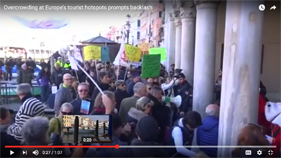Wish you weren’t here?

Global media blast mass tourism hordes and anti tourism riots but there is a way out
What the travel industry says:
TravelMole Poll. ‘Death in tourism Venice – you always hurt the one you love’ – Is overcrowding a real issue ? YES 74.47 % NO 25.53 %.
The black side of tourism has finally hit the global headlines. Maybe adverse publicity will reduce business, certainly it will spark more riots in more destinations, possibly it will cause destination politicians to seek sustainable solutions.
It’s now 10 years that I’ve been running story after story about tourism overcrowding and the impotence of destinations to act strongly and sustainably.
There is no point in going over the story again and again. It is simple, there are too many tourists visiting high visibility destinations without paying inhabitants for the privilege of making their lives more difficult. Less visible destinations would love to have more tourism but they are largely empty.
Today’s massive (maybe existential) problem has been largely caused by organizations like Tripadvisor, Airbnb and Booking.com who use the great and powerful brands of tourism such as Venice, Barcelona, Amsterdam free to generate business whilst they have no responsibility for managing these brands.
Just like the pirates of old, they will slash and burn, rape and pillage until these gems of our world heritage fall into disrepair and disrepute as their inhabitants become refugees from tourism and leave for saner lives elsewhere.
But destination governments could take firm action now before it is too late to support the enormous opportunities that tourism delivers whilst getting their own fair share for their true constituents.
The problem is that tourists are represented by intermediaries with dramatically growing businesses. Whereas destinations are not cohesive entities – destination managers have historically fulfilled passive management roles and active marketing ones – their successes being characterized by numbers of arrivals rather than value of business.
It is ridiculous to assert that destination visitor economies benefit from tourist visitor spend because nobody really knows – the usual figures (such as tourism satellite accounts) are basically simple multiplier figures on the back of cigarette packets. No real studies have been made of what money stays in local economies or who gets it.
Tourism spend figures are smoke and mirrors because the tourism community in any destination is incredibly disparate. Tourism clearly benefits shops, hotels, self-catering, night clubs, car hire, restaurants, bars, coffee shops and many more.
On the other hand there is very little mention of what tourism activity costs the members of the local communities. In destinations that are called ‘successes’ by dint of numbers it is the local communities that have to pay for the ‘success’ – nowhere affordable to live, crowded streets, full car parks, shops and restaurants, increased thefts, drunkenness and hooliganism and more. What benefits do they get in return for this and other challenges they suffer to their lifestyles to provide profits for global organizations?
Of course local people are willing and happy to have reasonable numbers of tourists in their home place. But thousands and thousands? It’s ridiculous to think that there is no limit to their tolerance.
Unless they get real benefits that appear to be fair.
So the answer is hypothecation. A charge that is levied on the intermediaries and visitors designed to manage tourism flows, dates and times (for instance higher in high season and lower in low season) linked to a very unfashionable process – ‘Destination Carrying Capacity’. Maybe destination governments could take notice of Disney and Ryanair?
Then the global travel and tourism megaliths like Priceline inc and Google and tourists could pay a charge designed to provide local facilities for local people, initiatives for local employment and recreation for instance. All to reward locals for their inconvenience and create better places to live in.
Tripadvisor and Airbnb could then brag that they really ARE DOING GOOD with some sincerity.
So that deals with the social, cultural, economic aspects of tourism and a little of the environmental ones.
Tourism’s massive environmental impact is not in destinations at all, it is in our seas and our skies.
Over 80% of tourism’s emission impacts are air and cruises. As a result of the Chicago Convention of 1947 and its defence by the ICAO, airlines pay no tax at all anywhere on their fuel and spare parts, whereas the world’s population will ultimately pay for their emissions. Cruise companies are by far the tourism world’s worst polluters both of detritus in our seas and of massed tourists in destinations. For their own sakes and for the benefit of tourism they both need to be held to account.
If you haven’t read what a bad press mass tourism is getting – here are just a few stories from the last few days:
CN Traveler: Mallorca and Ibiza Crack Down on Airbnb Rentals to Curb Tourist Numbers
Euronews: The dark side of tourism – Venice flooded by visitors:
Daily Telegraph: Britons face being turned away from Spanish Airbnb apartments in crackdown on illegal letting:
South China Morning Post: Wish you weren’t here? First Venice and Barcelona – anti-tourism protests spread across Europe:
The Guardian: First Venice and Barcelona: now anti-tourism marches spread across Europe:
Reuters: Spain’s Balearic Islands to fine illegal tourist rentals:
Daily Mail: Cambridge suggests tourist tax and restricting short breaks to protect city from overcrowding
Deutsche Welle: Whales need a summer vacation – from tourists:
Asia Online: Even in Cambridge: Chinese tourists become a nuisance to UK locals
Valere Tjolle
@ValereTjolle
Valere
Have your say Cancel reply
Subscribe/Login to Travel Mole Newsletter
Travel Mole Newsletter is a subscriber only travel trade news publication. If you are receiving this message, simply enter your email address to sign in or register if you are not. In order to display the B2B travel content that meets your business needs, we need to know who are and what are your business needs. ITR is free to our subscribers.








































TAP Air Portugal to operate 29 flights due to strike on December 11
Qatar Airways offers flexible payment options for European travellers
Airbnb eyes a loyalty program but details remain under wraps
Air Mauritius reduces frequencies to Europe and Asia for the holiday season
Major rail disruptions around and in Berlin until early 2026